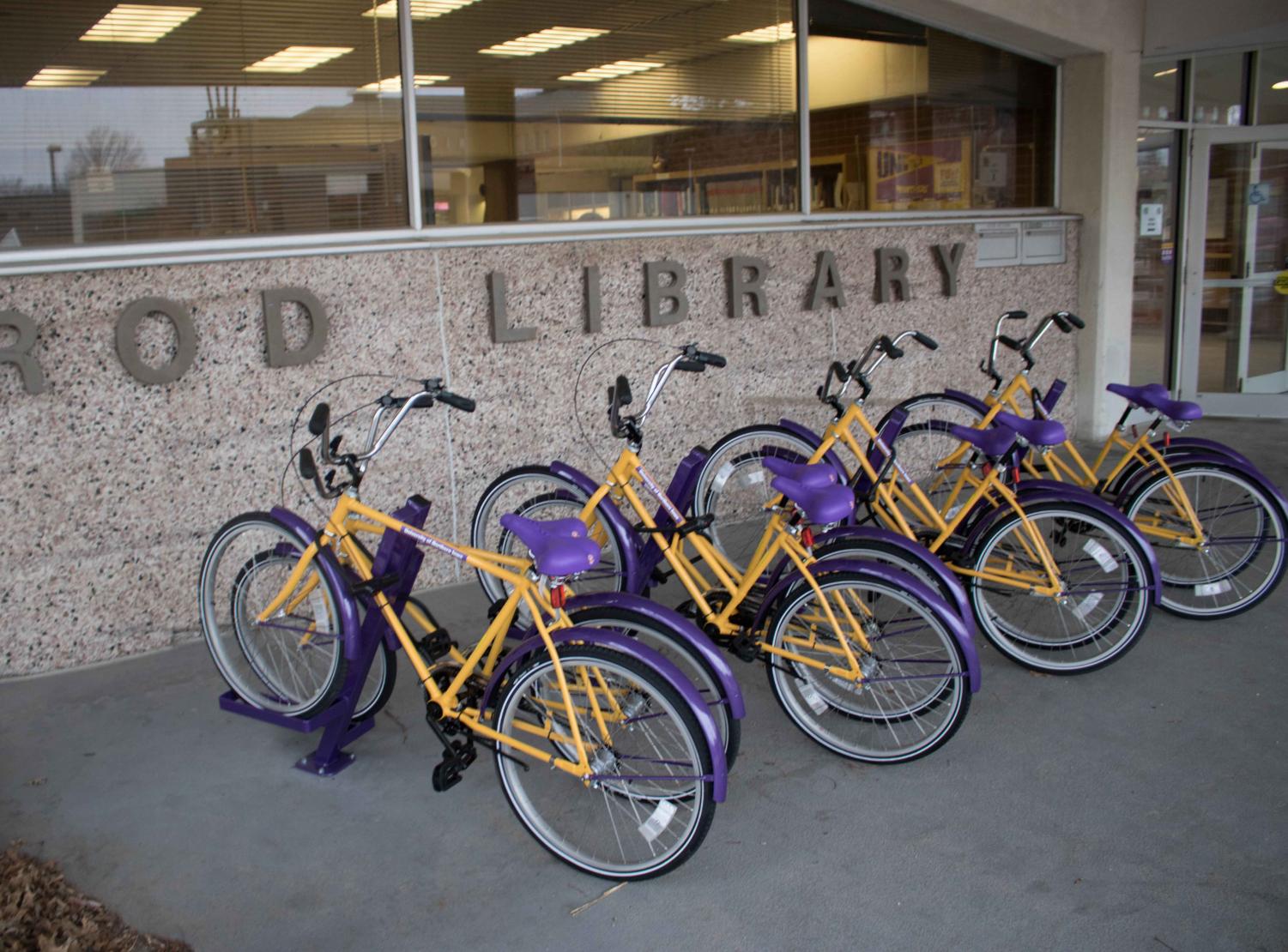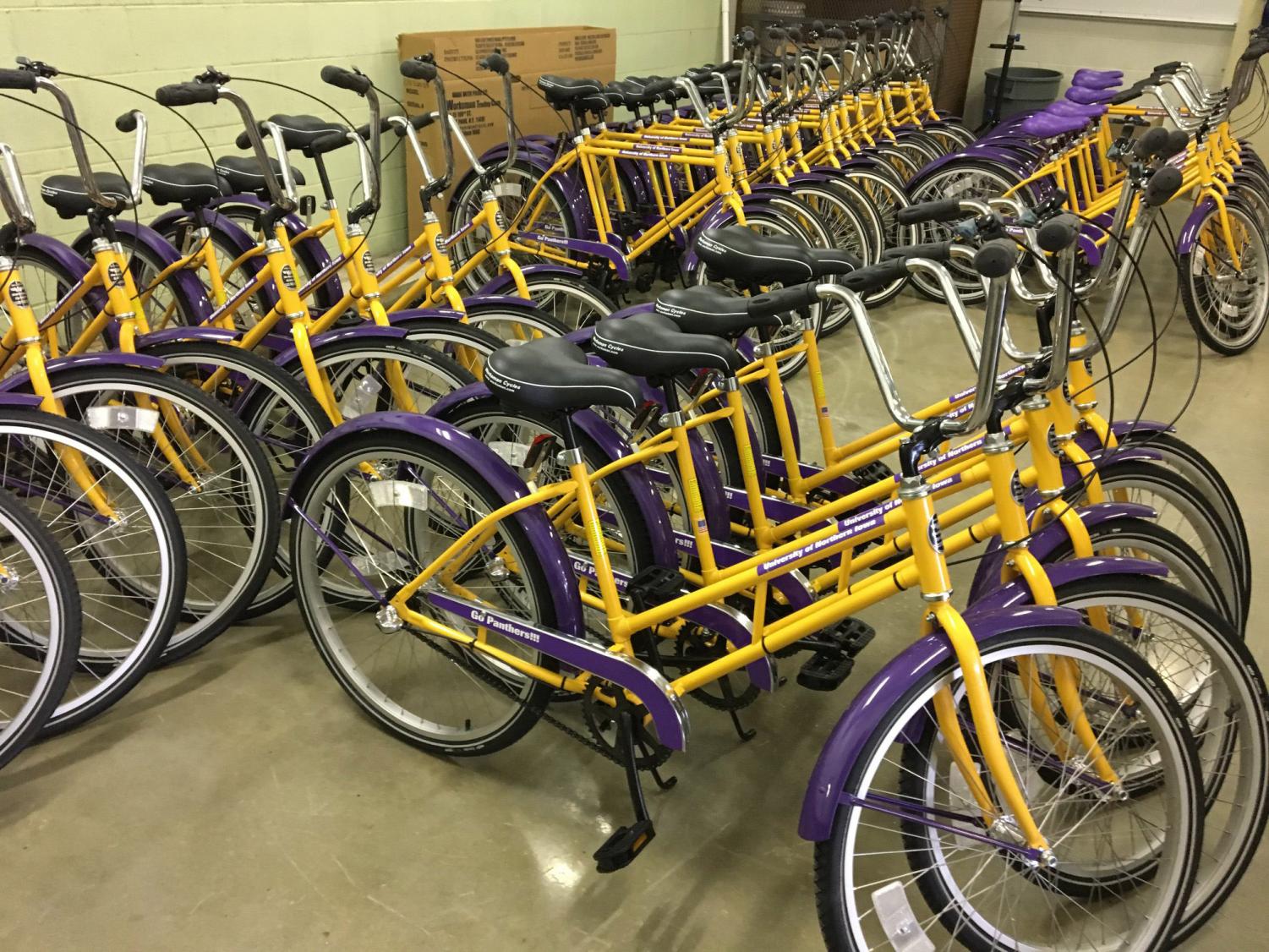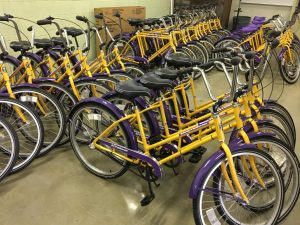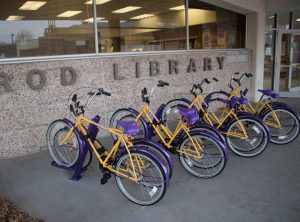UNI expands bike-share program
Apr 16, 2018
Before the semester ends, students will be able to check out bicycles from Rod Library as part of a student bike-share program.
When UNI’s Office of Sustainability shared a photo of a new fleet of purple and gold bikes on Facebook on April 3, they received over 350 reactions and 130 shares.
“Honestly I don’t know that we’ve ever done a program that we’ve had this much positive feedback on,” said Eric O’Brien, director of sustainability. “Across the board, students have just said, ‘that is really, really cool.’”
“I think it would just be a really cool idea to be able to check out a bike,” said Lexi Dinsmore, a sophomore English education and TESOL major. “I think I would be more active on campus. It would give me something different than just walking around.”
Students are currently able to participate in the Office of Sustainability’s naming competition for the new bike-share program. Suggestions can be submitted via a link on UNI Sustainability’s Facebook page; finalists will be up for public voting later in the week. The winner will be revealed during the UNI Earth Day Celebration on April 25 outside the Union.
Although unbeknownst to many students, UNI’s bike-share program has been running for nearly three years.
The existing program — a partnership between Northern Iowa Student Government (NISG) and the Office of Sustainability —had about 40 bikes, the majority of which were reclaimed from campus bike racks after being left on campus at the end of the school year. Students could rent a bike for one semester for a fee of $35, which also covered a bike chain, maintenance and winter storage.
The expanded program will include 20 bikes from the old program, as well as 40 new UNI-branded bikes. In addition to long-term rentals, students will now be able to rent bikes for shorter periods of time.
“Right now, we’re going to have eight bikes that are available for short-term checkout out of the library,” O’Brien explained. “You’d check them out the same way you would check out a book or a laptop.”
The vision for a bike-share program emerged from a capstone class project in the spring of 2014. The students took their proposal to NISG, who then brought it to O’Brien — who, coincidentally, was the instructor of the capstone class.
“The sustainability office, NISG, the vice president for student affairs and the international programs office each put in money to start the program — so, to get the initial group of bikes and get them fixed up so they could be ridden,” O’Brien said.
Stored in the Nielsen Field House, the first bikes were rented out in the summer of 2015. During the 2016-17 school year, the program began to grow.
“I was really interested in seeing how we could solidify the program because it was a really good program, but we didn’t have a lot of bikes to use and the bikes weren’t always the most reliable,” said Avery Johnson, a senior English major who was serving as student body vice president at the time.
After Johnson had explored different options, including the possibility of moving to the WRC, O’Brien approached him about passing a resolution in the senate supporting the bike-share program.
O’Brien went on to include that resolution in a proposal submitted to the PepsiCo Zero Impact Challenge, a competition supporting eco-innovations on college campuses.
“We were the winner in the transportation division, and as part of that competition, [Pepsi] agreed to buy us a bike fleet for campus,” O’Brien said.
For the percentage of the student population who do not have access to vehicles — most notably international students — the bike-share program will provide more mobility, Johnson said.
Even for students who do have vehicles, O’Brien noted that biking is often easier than walking to one’s car, driving to campus, finding a parking spot and walking to class.
“People don’t realize how fast it is to be able to bike,” O’Brien said. “Our campus is a very accessible campus for biking [. . .] We’ve got very good sidewalk systems that are nice and wide to accommodate both pedestrians and bikers.”
In addition, both O’Brien and Johnson pointed out the extensive trail systems located around Cedar Falls.
“I don’t think students are really able to use those [trails] as well as they could, and so getting people bikes is a great way to explore the Cedar Falls community,” Johnson said.
“I’m really interested in ways that we’re connecting health issues along with the environment, and this is one of those ways. You’ve got not only the well-being of riding bikes and living healthier that way, but also, it clears your mind, and you’re able to just kind of enjoy that ride across campus,” O’Brien said. “And at the same time, you’re not driving a car, burning as much fossil fuels, things like that [. . .] And providing this economical option for students, so they’re not having to worry about bringing their own bike to campus.”












